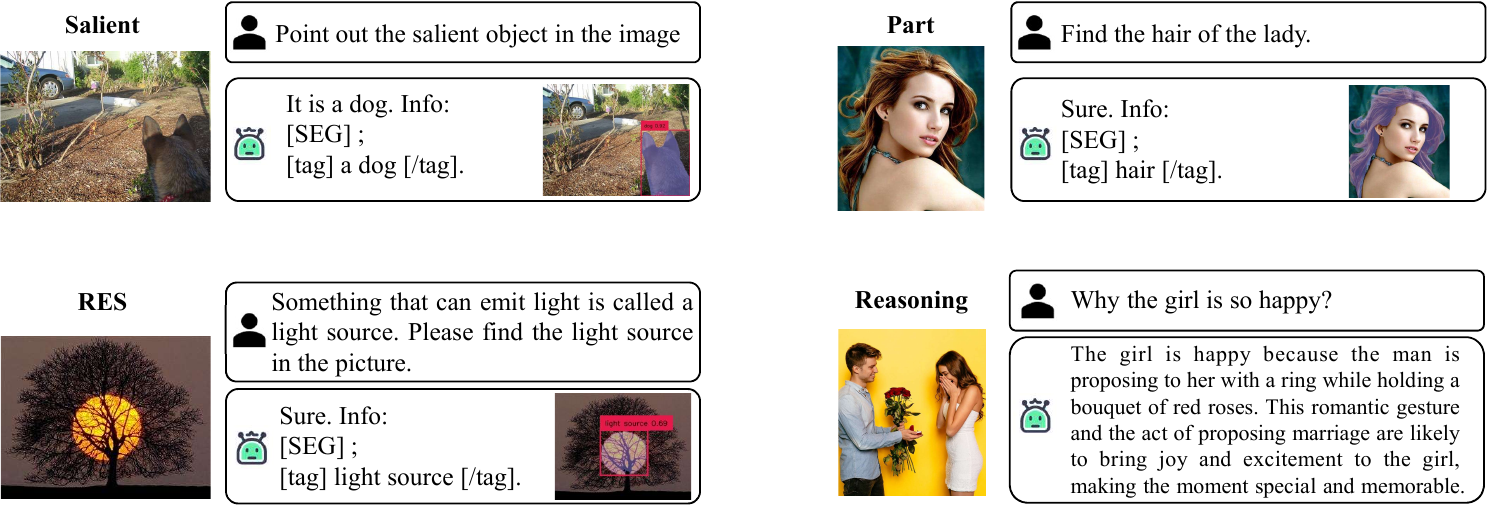
Multi-modal multi task LLM
Explore the docs »
View Demo
·
Report Bug
·
Request Feature
Table of Contents
Structure:
Examples
- Visual Understanding
- Image Captioning
- Video Captioning
- Visual Question Answering (VQA)
- Visual Segmentation
- Referring Expression Segmentation (RES)
- Salient Object Segmentation
- Semantic Segmentation
- Visual Grounding
- Referring Expression Comprehension (REC)
This is an example of how you may give instructions on setting up your project locally. To get a local copy up and running follow these simple example steps.
Run the following commands in terminal:
pip install -r ./shells/requirements.txt
cd ./models/GroundingDINO && ./install.sh && cd ../..And please should install requirements of GroundingDINO for Grounding. Otherwise, you can disable grounding module.
Why do these?
- install requirements:
pip install -r requirements.txt - build cuda core for GroundingDINO:
cd ./models/GroundingDINO && ./install.sh && cd ../.., if not may ariseUserWarning: Failed to load custom C++ ops. Running on CPU mode Only! warnings.warn("Failed to load custom C++ ops. Running on CPU mode Only!")
# save to requirements.txt
polyglot
shortuuid
fire
fastapi
uvicorn
gradio
omegaconf
decord
einops
ninja
accelerate
torch==1.13.1
torchvision==0.14.1
transformers==4.29.1
tokenizers==0.13.3
deepspeed==0.8.3
imageio==2.31.1
SentencePiece
pydantic==1.10.12
peft==0.4.0
yacs
addict
yapf
supervision
opencv-python-headless==4.2.0.34
| Dataset | Images/Videos | Annotations |
|---|---|---|
| LLaVA CC3M | LLaVA-CC3M-Pretrain-595K/image.zip | chat.json |
| TGIF | tgif | ullava_tgif.json |
Note that TGIF videos should be downloaded by the url in data/tgif-v1.0.tsv.
| Dataset | Images | Annotations |
|---|---|---|
| LLaVA Instruction 150K | coco2017 | llava_instruct_150k.json |
| RefCOCO | coco2014 | ullava_refcoco.json |
| RefCOCOg | coco2014 | ullava_refcocog.json |
| RefCOCO+ | coco2014 | ullava_refcoco+.json |
| RefCLEF | saiapr_tc-12 | ullava_refclef.json |
| ADE20K | ade20k | ullava_ade20k.json |
| COCO Stuff | cocostuff | ullava_cocostuff.json |
| VOC2010 | voc2010 | ullava_pascal_part.json |
| PACO LVIS | paco | ullava_paco_lvis.json |
| Salient 15K | salient15k | ullava_salient15k.json |
Dataset config example
dataset:
llava:
data_type: 'image'
image_token_len: 256
build_info:
anno_dir: './data_annotations/llava_instruct_150k.json'
image_dir: './coco2017/train2017'
portion: 1.0
vis_processor: 'clip_image'
refcoco+:
data_type: 'image'
image_token_len: 256
build_info:
anno_dir: './annotations/ullava_refcoco+_train.json'
image_dir: './coco2014'
template_root: './datasets/templates/SEG.json'
portion: 1.0
vis_processor: 'clip_image'Note:
- We re-organize most of the dataset annotations for easier training, but all of us must follow the rules that the original datasets require.
- Prepare Open-Source LLaMA models
| Foundation model | Version | Path |
|---|---|---|
| Vicuna 7B HF | V1.1 | vicuna_7b_v1.1 |
| LLaMA2 7B HF | - | meta-llama/Llama-2-7b-hf |
| SAM | ViT-H | sam_vit_h_4b8939.pth |
| GroundingDINO | swint_ogc | groundingdino_swint_ogc.pth |
Note:
- LLaMA2 is trained with bf16, convergence error may happen when stage 1 training with fp16.
- The default tokenizer.legacy of Llama-2 is False, and may rise tokenization mismatch error with some conversation
template.
- Errata: The base LLM used in the paper is Vicuna-v1.1, not LLaMA2. Sorry about the mistake.
- Prepare datasets
- Set config in
configs/train/ullava_core_stage1.yaml
Note set all datasets path or output path according to your experiments. 4. Train Stage I with multi GPUs
./shells/pretrain.shor python train_ullava_core.py --cfg_path './configs/train/ullava_core_stage1.yaml' for 1 GPU.
The first stage with 4 A100 80G with bf16 costs ~6hours for 1 epoch. Then you can find the trained model at the output_dir, for example, './exp/ullava_core_7b'
After Stage I training finished, we can go through the following step, that is, fine-tuning.
- Prepare datasets
- Set config in
configs/train/ullava_stage2_lora.yaml (for lora)
configs/train/ullava_stage2.yaml (for non lora)
- Train Stage II with multi GPUs
./shells/finetune.shor python train_ullava_core.py --cfg_path './configs/train/ullava_stage2_lora.yaml' for 1 GPU.
Q1: What conv_tpye used in training?
A1: Stage I: 'conv_simple'. Stage II: 'conv_sep2'
Q2: When LoRA used?
A2: Stage I: We have not used in this stage. Stage II: According to your devices.
- Set config
configs/eval/eval_res.ymal (for RES task)
configs/eval/eval_rec.ymal (for REC task)
configs/eval/eval_salient.ymal (for Salinet segmentation task)
- Run
python evaluation/eval_ullava.py --cfg_path './configs/eval/eval_res.yaml' (for RES)
python evaluation/eval_ullava_grounding.py --cfg_path './configs/eval/eval_rec.yaml' (for REC)
python evaluation/eval_ullava.py --cfg_path './configs/eval/eval_salient.yaml' (for Salinet)
Modify the parser in the evaluation/inference_ullava_core.py and evaluation/inference_ullava.py for stage I and stage II, respectively.
python evaluation/eval_ullava.py
python evaluation/eval_ullava_grounding.py
Distributed under the Apache License. See LICENSE for more information.
@article{xu2023ullava,
title={u-LLaVA: Unifying Multi-Modal Tasks via Large Language Model},
author={Xu, Jinjin and Xu, Liwu and Yang, Yuzhe and Li, Xiang and Xie, Yanchun and Huang, Yi-Jie and Li, Yaqian},
journal={arXiv preprint arXiv:2311.05348},
year={2023}
}
- Visual Segmentation
- Instance Segmentation
We sincerely thank the open source community for their contributions.
See the open issues for a full list of proposed features (and known issues).



